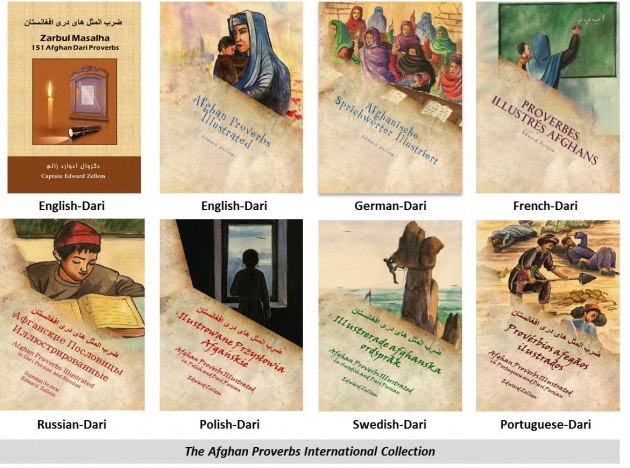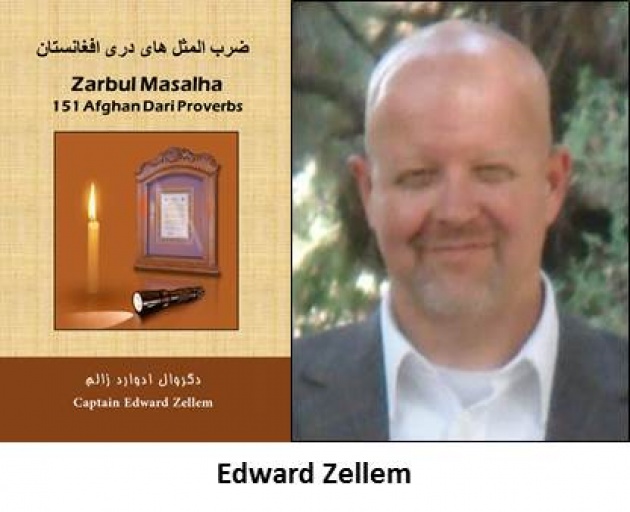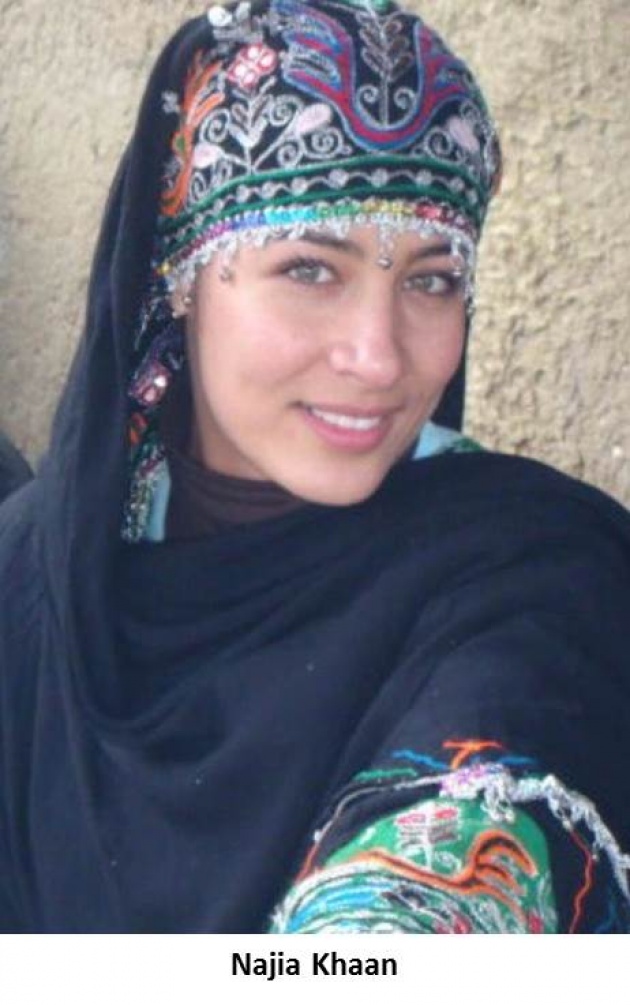 Introduction: Some of Najia Khaan's fans and friends say she has the "face of an angel." I’ve never seen an angel, so I don’t know if that’s true.
Introduction: Some of Najia Khaan's fans and friends say she has the "face of an angel." I’ve never seen an angel, so I don’t know if that’s true.
But what I can say is that after interviewing Afghan-British actress, writer, model and socialite Najia Khaan, I know that she has the soul of an Afghan.
Najia Khaan was born in Afghanistan’s northern city of Mazar-e-Sharif. When she was a baby, the Soviet invasion of Afghanistan forced her family to flee as refugees to Pakistan. They eventually settled in England in the 1990s. Young Najia grew up as a schoolgirl in London, influenced by both Afghan and British ways in what often became a cultural tug-of-war. She emerged as a unique artist and thinker with much first-hand experience of both deep joy and personal pain.
As an actress Najia Khaan has performed in several Afghan, Bollywood and British films. Most recently, she starred as an evil nun in a soon-to-be-released independent British feature film called “The Crypt.”
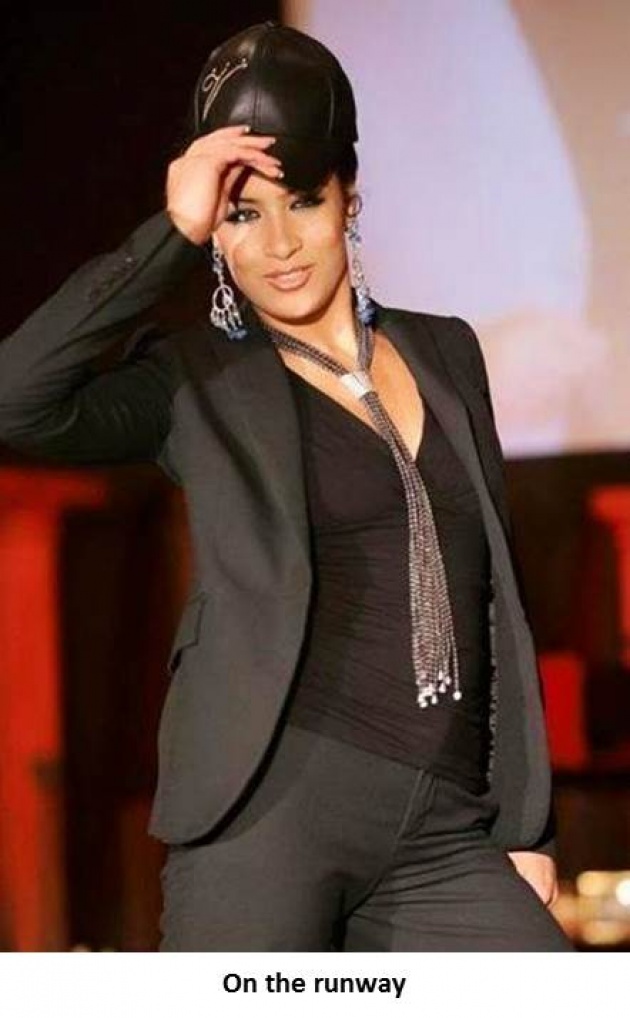 "The Crypt" is the debut film of British director Mark Murphy, and was shot in late 2012 in the same church featured in Les Miserables. The film takes the found footage genre and fuses it with traditional film styles and techniques, creating a fast-paced horror story told from two opposing perspectives.
"The Crypt" is the debut film of British director Mark Murphy, and was shot in late 2012 in the same church featured in Les Miserables. The film takes the found footage genre and fuses it with traditional film styles and techniques, creating a fast-paced horror story told from two opposing perspectives.
Najia Khaan is very active on the European social scene. She has had the opportunity to meet a wide range of celebrities ranging from national leaders like former U.S. President Bill Clinton and England’s Prince Andrew, to Bollywood and Hollywood superstars like Salman Khan, Shah Rukh Khan, Saif Ali Khan, Kareena Kapoor, Mickey Rourke and Lionel Richie, to global supermodels like Tyson Beckford, to famous athletes like the world’s top-ranked polo player Facundo Pieres, to jet-setting global entrepreneurs like Ciro Orsini.
The list goes on, but it was a bit of a struggle to get even these famous names out of Khaan. She is protective of her many professional and personal contacts, and she doesn't care much for namedropping. 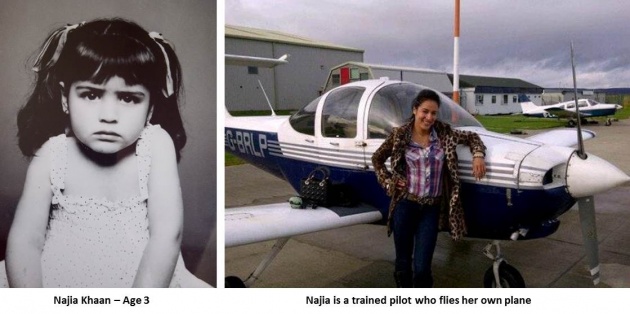 There is much more to Najia Khaan. She is known as somewhat of a daredevil, and is a prime example of the adventurous spirit found in many Afghan women. Najia has learned to fly planes and ride motorcycles. She has played polo, snorkelled with sharks and stingrays, and once even flew a hang-glider from the highest mountain in northern France.
There is much more to Najia Khaan. She is known as somewhat of a daredevil, and is a prime example of the adventurous spirit found in many Afghan women. Najia has learned to fly planes and ride motorcycles. She has played polo, snorkelled with sharks and stingrays, and once even flew a hang-glider from the highest mountain in northern France.
Najia Khaan brings this passion for life to her acting and writing. She says these are “natural callings” for her rather than conscious career choices. She sums it up by saying, “My main interest is life itself. What a beautiful gift it is.”
As an Afghan-British woman, Najia Khaan also is a big fan of Afghan Proverbs and culture. She speaks here in an exclusive interview with Edward Zellem, a U.S. Navy Captain and author of “Zarbul Masalha: 151 Afghan Dari Proverbs” and the “Afghan Proverbs Illustrated” series.
-----
Film Annex: Najia jaan, it’s a pleasure to speak with you. You seem to have quite an exciting life.
Najia Khaan: Tashakur, Edward jaan. After reading about your work with Afghan Proverbs, I don’t think you have had a dull time of it either! This interview is an exciting adventure too. I try to look at everything in my life as an adventure, even the small things.
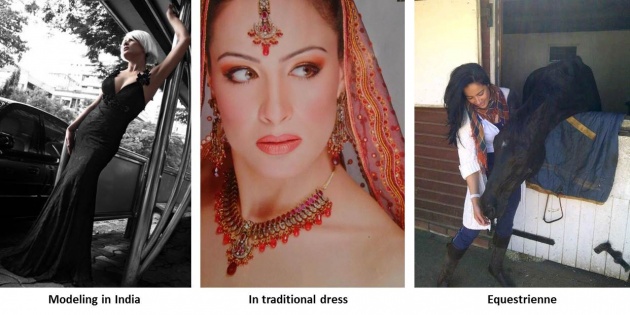
FA: You have worked as an actor in several films, including Indian “Bollywood” films. How did you begin this career? What can the Afghan film industry learn from Bollywood?
NK: Acting was a natural choice for me. Everything about life is so beautiful and I want to explore it. What better way than as an actor where I get the chance to play different parts and become so many different human beings. I get to explore how a character in a story or situation would feel and live. It’s truly marvelous.
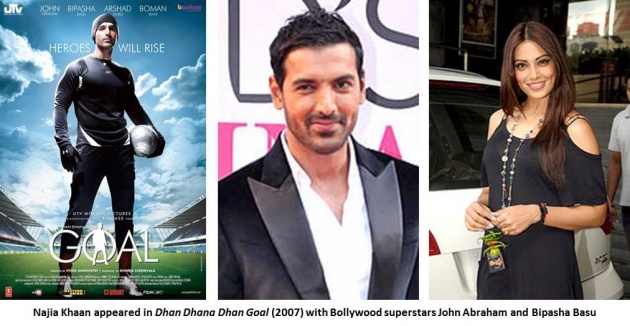
My first Bollywood film was a small part in a movie called Shaadi Ka Laddoo. Although it was just a small part, people in the Indian film industry took notice and more offers for acting jobs started coming in. I accepted a part in an Indian TV series called Aisa Des Hai Mera, and then a role in a Indian film called Dhan Dhana Dhan Goal with Bollywood superstars John Abraham and Bipasha Basu.
Bipasha Basu was particularly interesting. She had studied and planned to be an accountant, but chose a very different path after becoming a finalist for Ford Models' "Supermodel of the World" at the age of 17. I loved every moment of my time in Bollywood. Many people in the Indian film industry are truly fascinating.
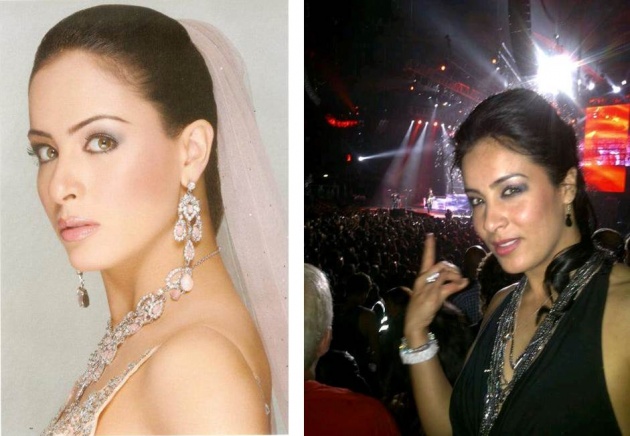
But after that, I decided take a pause in Bollywood for some personal reasons. The Indian film industry is very exciting and colourful but also it is very intense. It can be easy to lose yourself completely in that environment, and I had other plans. I did accept a part in an Afghan film called Ayenda اینده a few years ago, directed by Yousof Rouyan. We filmed it in and around London, and it was great fun.
I think the main thing that the Afghan film industry can learn from Bollywood is that a good story is not enough. It is very important to have a strong director who actually understands filmmaking, and to have a good cinematographer. The most important thing is to have a great crew and a united team effort. Filmmaking is all about being a strong family.
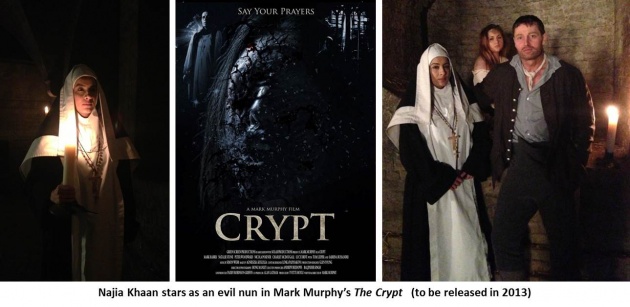
FA: Please tell us about your latest film, The Crypt.
NK: I was back in London for a few years after my Bollywood experience, and I thought it would be fun to act in a film again. So I accepted a part in a British independent film called The Crypt. It’s a horror movie by British director Mark Murphy and I enjoyed playing the role of an evil nun. We filmed it late last year and it will be released soon, so I can’t give away too much about the plot. About all I can say is that it is the story of a team from the Catholic Church investigating the tragic deaths of a group of young people in the crypt of a convent.
It was a great role and it was fun to get back into acting again. I feel so alive on movie sets. When the director says ‘ACTION!’ I enter a different world where I become someone else for a while. I might do another film, I don’t know. There are many things I like to try and I’m not ready to settle on one thing just yet. As one of the Afghan Proverbs in your great book Zarbul Masalha (“Proverbs”) says,
Saar zenda baasha, kola besyaar ast.
سر زنده باشه، کلاه بسیار است
It means, “If there is life in your head, there are lots of hats.” That’s a perfect proverb for me. I like to try on lots of different hats. I say everyone should try on different hats. You never know which one will fit perfectly. I use Afghan Proverbs all the time.
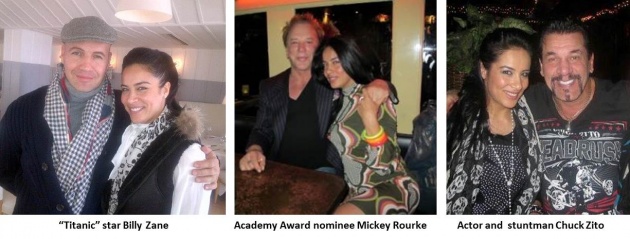
FA: Let’s talk more about the Proverbs in a few minutes. You have met some very interesting and famous people on the European social circuit. What is your favorite celebrity encounter story?
NK: (laughs) I love storytelling. There are many stories, but my all-time favorite story happened about five years ago at a society event in London. The Indian film megastar Shah Rukh Khan was there. He is so famous in South and Central Asia that people usually just call him SRK. When a person is known just by his initials you know he is truly famous. (laughs)
In any case, SRK is one of the biggest film stars in Bollywood cinema history, and he the most-awarded Bollywood actor of all time for “Best Actor” awards. The Los Angeles Times has called him “the world's biggest movie star" and he is said to have fans in the billions. Indian media popularly call him the King of Bollywood, and Newsweek Magazine says that SRK is “one of the 50 most powerful people in the world.” So he is a “big deal” in the industry, as they say.
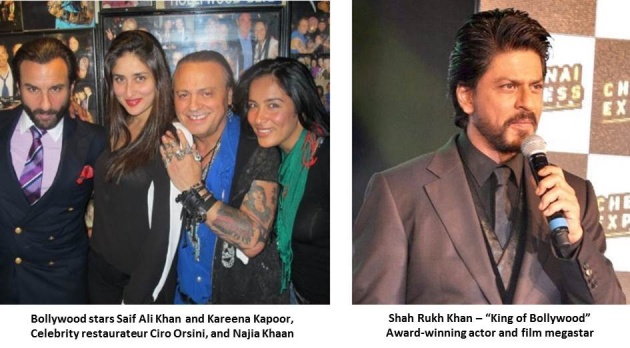
SRK was performing at an event I attended in London. It was hosted by one of India’s largest banks and there were many lovely people there. To make a long story short, SRK singled me out in front of a large audience and we began joking with each other. At one point he laughed and said to me, “You call yourself an Afghan - so why can you only speak Dari, and not Pashto too?”
(You see, SRK’s grandfather is from southern Afghanistan, and SRK often refers to himself as a “Pathan ka bacha,” meaning “son of a Pathan/Pashtun.”)
Then he boldly asked if he could say something to me in Pashto. I laughed and told him to go ahead, but that I would need a translator because I only speak Dari.
SRK then said a few words in his “Pashto.” For a split second I was stunned – because I understood every word!
Then I started laughing. I realized that he was speaking Dari, not Pashto! Now the joke was on him. “What a shame!” I said. “You call yourself a Pathan, but you cannot even tell the difference between Dari and Pashto!”
The audience roared. They laughed even harder when SRK replied, “That’s not fair. All these years, everyone told me I was speaking Pashto!”
Anyway, it was all great fun. We bantered some more in front of the audience, then we ended up dancing together onstage to a song called Dard-e-Disco (Pain of Disco). The audience went wild and I loved it.
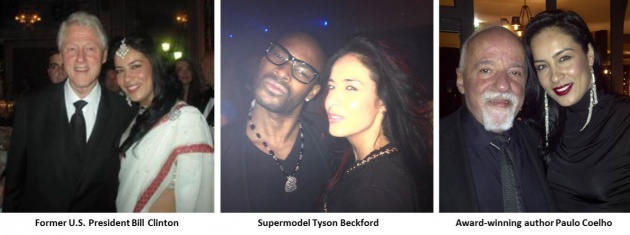
Afterward, I was a little surprised at myself for being so bold with a global superstar. But I’m not afraid of much. I’ve met Prince Andrew, Bill Clinton, Prince Albert of Monaco, Paulo Coelho, Tyson Beckford, Facundo Pieres, Mickey Rourke, Armand Assante, Jean-Claude Van Damme, Paris Hilton, Salman Khan, Arjun Rampal, Jermaine Jackson, Lionel Richie and many other well-known people. You mentioned a few of them earlier. They are all great and accomplished people, and they all are very nice. But in the end we all are people. So I don’t worry about it.
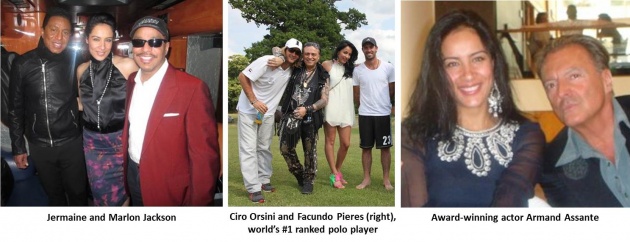
FA: How can film, the Internet and social media help improve the lives of women and youth in Afghanistan?
NK: These are very strong media that can change society. They either can make it better, or they can make it worse. Everyone has to take some personal responsibility for this, whether as a creator or as a consumer. As for films, most people watch them just for fun and then forget them. But it is even better if people watch films with their minds and not just their eyes. Many films have messages that can make you a better person. These films have power and can reach and influence millions of people. 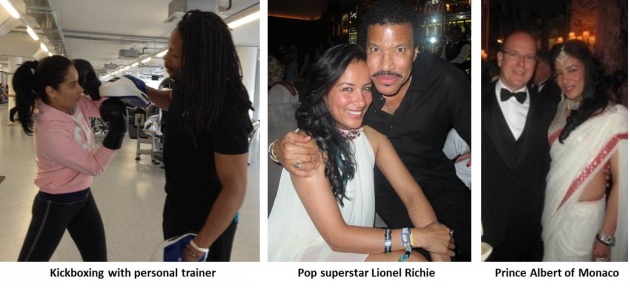 Social media is so great if used properly. It has improved many lives by bringing together families and friends who are far apart. For instance, I haven’t met any of my cousins in Afghanistan face-to-face, but I am in touch with them via Skype, Viber, and Facebook and I feel like I know them.
Social media is so great if used properly. It has improved many lives by bringing together families and friends who are far apart. For instance, I haven’t met any of my cousins in Afghanistan face-to-face, but I am in touch with them via Skype, Viber, and Facebook and I feel like I know them.
Social media is also a great tool for spreading education. So many people live in far corners of the earth where teachers may not be able to go physically. But they can go anywhere online through Skype. Educational software like Film Annex’s Examer also make it much easier to educate the local people. The world has become such a small place, really.
FA: If you could make a film about an Afghan hero or heroine, who would be your number one choice, and why?
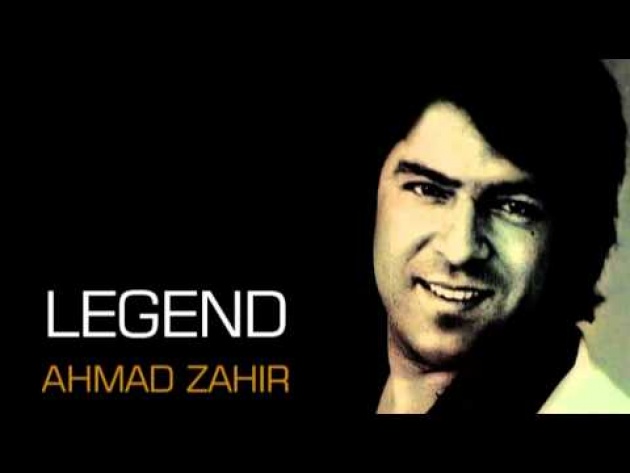 NK: Ahmad Zahir is my number one hero. I would love to bring his music back to life in a film. Most Afghans call Ahmad Zahir “The King of Afghan Music” and he is truly a cultural icon.
NK: Ahmad Zahir is my number one hero. I would love to bring his music back to life in a film. Most Afghans call Ahmad Zahir “The King of Afghan Music” and he is truly a cultural icon.
He mostly composed and performed rock and pop music in a style similar to Elvis Presley. His songs have beautiful music and lyrics. His music has had a great effect on me, and on almost every Afghan. His tragic and untimely death was a very sad time for all Afghans.
I would go so far as to say that at one point in my life, Ahmad Zahir’s music saved my life. His music picked me up when I felt like I was falling into an abyss, and it inspired me to live another day. His music helped me smile when I was in tears, and helped me get up and dance when I was down. You should definitely listen to some of his best songs – here, here and here.
But really, all my Afghan brothers and sisters are my heroes and heroines. It would be an honor to make a film about ordinary Afghans. Many of them live through struggle every single day of their lives, and most remain humble and happy people. In my opinion, these people are far more heroic than movie stars and artists that people sometimes call heroes. Actors and artists imitate real life. If these actors and artists are considered “heroes” then real people doing real things are much more than that - don’t you think?
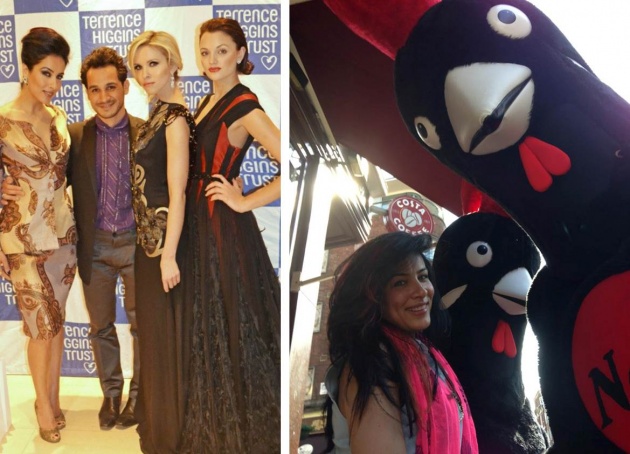
FA: We have heard you are writing a book. Please tell us about it.
NK: Yes, I am writing a book. It is a sensitive subject about empowering children who are sexually, mentally or physically abused at a very young age, sometimes as little as even two years old. The book is based on true life stories. More people need to stand up to this kind of inhumanity. Sorry, I cannot tell you more than this at this stage but I will reveal more later. I am very excited about this book because its subject is so important.
If any Film Annex or Women’s Annex female readers would be interested in sharing their personal stories with me on this topic, I would be happy to hear from them by e-mail at najiakhaan@gmail.com. I can promise complete confidentiality, anonymity and empathy. You see, I myself was a victim of this type of abuse as a child. The stories must be told. They also must be told in a sensitive way, so good people can be more inspired to stand up to this type of abuse.
All people should learn to love each other more, respect each other more, and care for each other more. The best way to do this is by communicating more. When I say this, I am not asking people to love, respect and care out of fear. People should do it because they want to do it.
It is a brave thing to love. It is cowards who hate. People should remember this and become one, become united. I humbly ask all my dear Afghan brothers and sisters to give value to one another, listen to one another, and try to understand each other's pain.
Actually, the messages that can be found in Afghan Proverbs (Zarbul Masalha) ضرب المثل های can help all of understand this. My favourite Dari Proverb has a very important message for all victims of abuse:
ماهی را هر وقت از آب بگیری، تازه است
Maahee-raa har waqt az aab biggeree, taaza ast.
This important Zarbul Masal translates into English as “Whenever you take a fish from water, it is fresh.” The Proverb has a very deep meaning for me personally, and for anyone who has felt pain in their lives. What it means is that everyone has the possibility for a fresh start and a good life, even if they have suffered greatly.
FA: We’re glad that you enjoy and use Afghan Proverbs, Najia jaan. Do you have other favorites?
NK: I love Afghan Proverbs, and your bilingual collections of them are simply delightful! I am a big fan of your books and I am absolutely thrilled that they are in seven European languages now.
There is great wisdom in Afghan Proverbs, and I hope more people will learn some of them. They can be very useful! As you well know, Afghans have a Proverb for everything. They summarize life so beautifully and so well. Afghan Proverbs can be very philosophical and educational. Some, like this very famous Kabuli proverb, have deep meanings but are also quite funny:
دور نرو که گرگ می خورید ، نزدیک نیا که دیده ندارم
Duhr naro ke gorg mekhorid, nazdeek naya ke deeda nadarum.
It means “Don't go so far away that the wolf will eat you, but don't come close because I don't like you.” I will leave it up to the readers to interpret the meaning of that! (laughs).
Another one of my personal favourites is:
خارپشتک میگه بخمل بچیم
Kharpushtak mega,“Bakhmal bachaim.”
It means The porcupine says, “My son is velvet.” You see, the Afghan fabric bakhmal is very soft, like velvet. This Afghan Proverb means that most parents always see the good side of their children, and seldom see the bad side. That's so true.
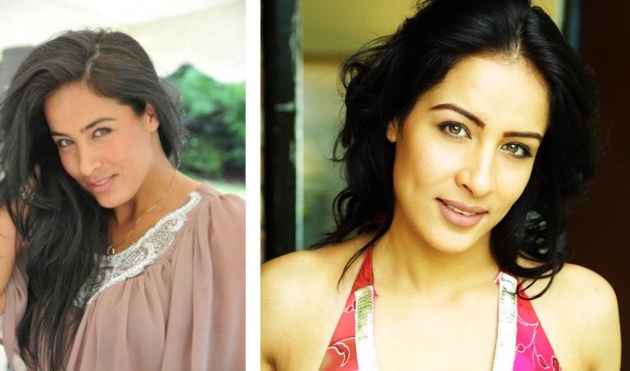
FA: What are your plans for the future?
NK: That’s very hard for me to answer, because I never plan (laughs). I live life in the moment and try to enjoy it to the fullest. Who knows when a person’s time is up?
But I do have goals, for sure. I want to finish and publish my book and bring its message to the world. I believe that when the time is right, everything falls into place. All that one needs to do is have the right intentions and put in the hard work. As they say, “From a small seed, a mighty tree may grow.”
Now I’m going to share a secret with you, Edward jaan. Remember the story I told you earlier about SRK teasing me for not knowing any Pashto? Well, I actually do know one or two Pashto Proverbs, (Mataluna) پښتو متلونه and I have heard you are collecting them for your next book. So here is one that describes my approach to life:
لعل په ايرو کښې نه پټيږي
It means “A jewel cannot remain hidden in ashes.” What it means to me is that that life is like a blank canvas, so choose your colors and paint it. People should do what their hearts move them to do, and the beauty of it will come out naturally. I am not talking about physical beauty, because that’s not important. What I am talking about is the beauty of the heart, and of the spirit.
I will be talking more about all this on Twitter, and also will share and discuss some of the favourite Afghan Proverbs that I adore so much. I hope Film Annex readers will follow me at @NajiaKhaan. I am new to Twitter, so I hope our friends will bear with me for a little while until I learn it. I have much more to share and say.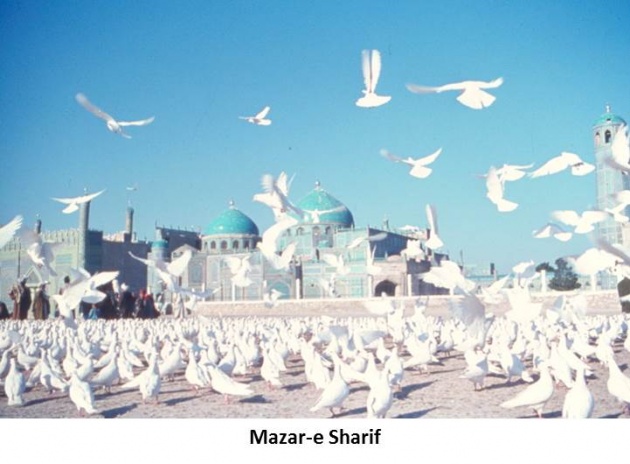
No matter where I go in the world or what I do, I will always be an Afghan in my heart. When I was about 11 years old and living in England, a family friend once called me Dukhtar-e-Englisee (English girl). دختر انگلیسی
I got really angry at that. I told her that it doesn’t matter where I am, or how I was raised. I was born in Afghanistan, and I am proud to call myself Mazari (from Mazar e-Sharif).
The woman was shocked to see my passion for Afghanistan, because I had not been there since I was a baby.
But my answer was “So what? Afghanistan is in my soul.”
FA: Tashakur, (thank you) تشکر Najia jaan. We look forward to hearing updates about your path in a future interview.
NK: With pleasure, Edward jaan. I look forward to it! Here’s my last Afghan Proverb for you until we speak again: Yaar zenda sohbat baqee. (As long as the friendship lives, there will be more conversations.) یار زنده صحبت باقی
Twitter: @afghansayings, @NajiaKhaan
-----
More of Edward Zellem's interviews with Afghan celebrities and thought leaders are coming soon on Women's Annex.
To be notified of new interviews, updates and articles, please visit here and click the green "Subscribe" button.

